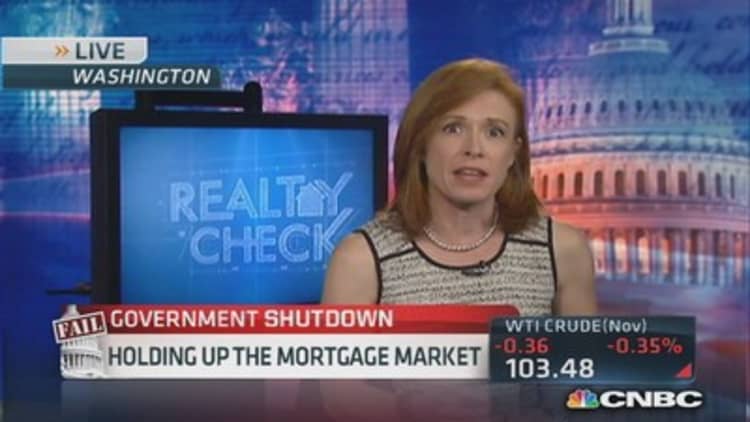
The second week of the government shutdown is giving consumers and lenders second thoughts about the housing market. Lenders last week were giving assurances that they would use "work-arounds" for tax documentation on mortgage applications, but now the future is not quite as clear.
"As the government shutdown continues, we'll continue to evaluate the circumstances," said Tom Goyda, a spokesman for Wells Fargo, the nation's largest lender.
Goyda said Wells Fargo is following guidance from Fannie Mae and Freddie Mac, which does not require IRS verification unless the borrower is financing multiple properties. If that is the case, the lender can close the deal without the verification but cannot deliver it to Fannie or Freddie without the IRS documents.
(Read more: Big investors take pause in rental market)
Jumbo loans (mortgages with values exceeding $417,000) are getting trickier, however. Some lenders will not do them at all without tax verification from the IRS. Others are delaying the process. They will all have to verify the tax information once the government opens again, and that's a gamble. These loans are inherently riskier because most are held on bank balance sheets.
(Read more: Jumbo mortgages explained)
Wells Fargo is continuing to originate jumbo loans without tax document verification from the IRS. As for the risk it is taking on in doing so, Goyda said, "I can't really speculate on that."
"The industry is doing what it can to make the shutdown as seamless as possible, but some lenders are more conservative about it than others," said Matthew Graham of Mortgage News Daily.
Loans backed by government insurance from the Federal Housing Administration (FHA) and loans through the Department of Veterans Affairs (VA) are largely not affected, as their processes are mostly automated or lenders have delegated authority to close the loans.
"Bottom line here: Loans that are anywhere close to 'vanilla' are moving through the system more or less as normal," Graham said.
"Vanilla," however, does not include loans needing flood insurance through FEMA, loans for self-employed borrowers or loans requiring Social Security number verification, he said.
Hardest hit by far is the Department of Agriculture home loan program. USDA loans, which are 30-year fixed with no down payment, make up less than 5 percent of the total mortgage landscape but are a favorite among first-time buyers and builders. As the so-called exurbs expand, more borrowers are qualifying for these loans. USDA is currently closed and not processing any loans.
(Read more: Map: Tracking the recovery)
"Some lenders are using this to advance competitive opportunity, rather than calling for an end to this, by advertising that they can close the loans if others cannot," wrote David Stevens, CEO of the Mortgage Bankers Association, in an email over the weekend. "This disruption is negative for housing and the consumer and will only get worse as this extends."
Stevens circulated an online ad sent to him by Premier Nationwide Lending, which touts "Good news for most of your borrowers!" The company said it has revised its policies to allow loans to be funded without IRS tax transcripts.
It noted that its policy is "short-term" and "temporary." An embedded video shows John Hudson, Premier's vice president in charge of regulatory affairs noting that USDA loans are still shut down, and that one family he's working with is "homeless" because of the shutdown.
Uncertainty in the mortgage market could not have come at a worse time. After a robust spring and summer sales season, housing was already beginning to slow down this fall, thanks to higher mortgage rates. Now concerns about the shutdown and the potential debt crisis have potential buyers pulling back yet again.
"Our September National Housing Survey results show that the improvements in consumer housing attitudes witnessed in recent months softened ahead of the government shutdown," said Doug Duncan, chief economist at Fannie Mae. "Americans' awareness of policy uncertainty leading up to the Oct. 1 shutdown and the pending debt ceiling debate appears to have grown as indicated by an apparent cautionary holding pattern in overall consumer housing and personal finance sentiment."
—By CNBC's Diana Olick. Follow her on Twitter @Diana_Olick.
Questions?Comments? facebook.com/DianaOlickCNBC


